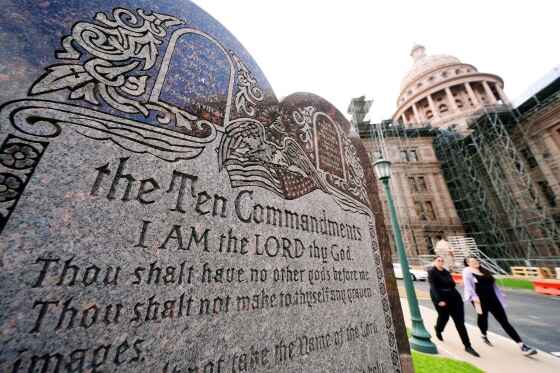- Texas law requires Ten Commandments posters in every public school classroom.
- Parents from multiple faiths argue the law violates separation of church and state.
- Federal judge in San Antonio previously blocked displays in some districts.
- New lawsuit adds 14 more districts, bringing the total challenged to 25.
- Supporters say it teaches “basic morals,” critics call it religious coercion.
When children returned to Texas classrooms this fall, some found a surprising addition to their walls: framed posters of the Ten Commandments. For some parents, it felt like a return to “moral basics.” For others, it was an alarming breach of America’s long-standing principle of separating church and state.
The clash has now spilled into the courts, where dozens of families are challenging what they call an unconstitutional mandate. “This simply cannot be reconciled with the fundamental religious freedom principles that animated the Founding of our nation,” one lawsuit reads.
Governor Greg Abbott and Texas lawmakers proudly championed Senate Bill 10, requiring every public classroom to display the Protestant version of the Ten Commandments.
Supporters insist it’s about teaching universal values “a pretty basic moral code,” as Hollywood actor Matthew McConaughey put it during an appearance on Joe Rogan’s podcast.
But critics argue the law sidelines other faith traditions while imposing a Christian standard on students. Parents from multiple backgrounds; Catholic, Jewish, Muslim, and nonreligioussay the law “fails to consider” students who don’t share the same beliefs.
The legal fight began in San Antonio, where parents sued 11 school districts. A federal judge quickly issued an injunction, halting displays. Yet the battle didn’t end there. A new lawsuit filed on September 22 expanded the challenge to 14 additional districts, including Conroe, Comal, Georgetown, Fort Worth, Arlington, and McAllen.
Some districts insist they’re complying. “Since the ruling and with the injunction now in place, we are blocked from displaying the Ten Commandments at this time,” a spokesperson for Lake Travis ISD told MySA. Others, parents allege, ignored the injunction and moved ahead with displays anyway.
The dispute cuts to the heart of a centuries-old debate in America: should government institutions ever prescribe religious teachings? Previous Supreme Court rulings say no. Yet, with shifting judicial interpretations, many see Texas’ classroom law as part of a broader trend of testing constitutional boundaries.
A San Antonio federal judge in the U.S. Western District of Texas will once again decide whether the posters must come down. With more than 25 school districts now tied up in lawsuits, only about 2% of the state’s 1,200 districts, the ruling could set a powerful precedent for the rest of Texas, and possibly the nation.
As parents wait for the next hearing, the stakes remain deeply personal. To some, the Ten Commandments are timeless wisdom. To others, they are a religious imposition with no place in a public classroom. And in between are Texas children—sitting at their desks, learning under the weight of a constitutional battle still unfolding.









